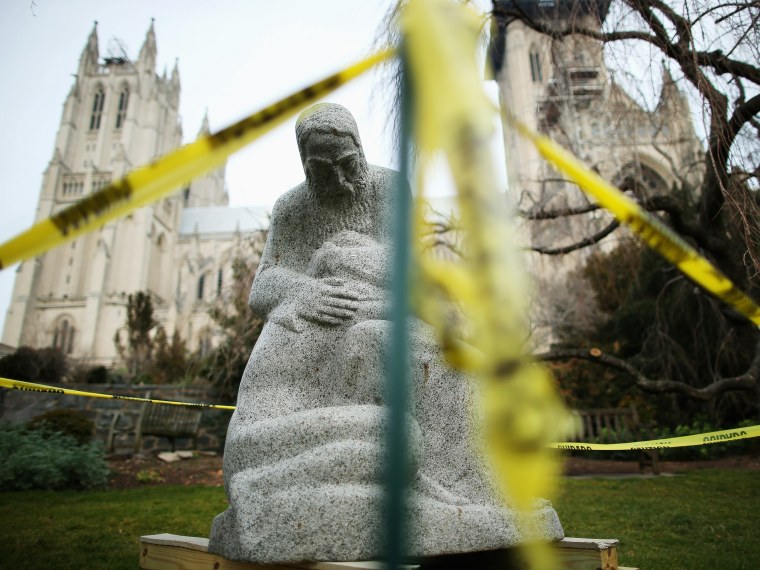While most of the commentary about the shutdown has focused on the politics involved, religious leaders are concerned about the moral implications.
On a day of brinkmanship in the halls of Congress, the U.S. Conference of Catholic Bishops sent Congress a letter, writing that their failure to find a bipartisan solution to avert the shutdown would cause hardship. The letter offers moral criteria for the budget debate, saying that Congress must protect the poor.
"Every budget decision should be assessed by whether it protects or threatens human life and dignity," church leaders wrote, explaining that they "write as pastors and teachers," not as "experts or partisans." "Government and other institutions have a shared responsibility to promote the common good of all, especially ordinary workers and families who struggle to live in dignity in difficult economic times."
The Conference of Catholic Bishops has protested the contraceptive mandate in the Affordable Care Act in the past. The group has remained close allies with conservative House members who have said they would consider only budget bills that included a provision to defund Obamacare, which has remained the heart of the debate. Cardinal Timothy Dolan of New York, president of the USCCB, told a meeting of American bishops in September that board members were “unanimous in their resolve to continue our struggle against the HHS mandate.”
On the other end of the Obamacare spectrum, Catholics for Choice, a pro-choice organization, has touted the Affordable Care Act's provision for women's preventative healthcare services. "On the eve of the of the first step to realizing greater access to healthcare for millions of Americans, the Catholic bishops once again proclaim that their opposition to reproductive health care is more important than women's health and liberty, the business of government, or the paychecks of hard-working government employees," Jon O'Brien, the group's president, said in a press release. "Don't use women's health and religious liberty as a bargaining chip to placate the bishops—not in this fight, and not ever."
Reverend David Beckmann, president of Bread for the World and the Alliance to End Hunger, said it was ironic to see how the bishops who remain firmly committed to fighting the Affordable Care Act's provision to guarantee preventive women's health services, did not mention anything about their political stance in their letter to Congress.
"It's interesting because the letter includes a quote from Pope Francis that encourages government to listen to 'diverse opinions' and nobody seems to be doing that," the reverend told MSNBC. "The Tea Party and extreme conservatives have deliberately provoked another confrontation and they are mainly responsible for the dysfunction of our government."
However, both the U.S. Conference of Catholic Bishops and Bread for the World agree that the standoff is hurting the country--especially Americans who are economically vulnerable.
Dr. Sayyid Syeed, the National Director for the Office for Interfaith & Community Alliances for the Islamic Society of North America, said in a press conference Monday that the continued brinkmanship hurts the democracy movement in Muslim countries, since opponents can use the United States as an example of the problems of democracy.
Reverend Beckmann and Dr. Syeed joined 31 other progressive faith leaders, including presiding bishops of the Lutheran and Presbyterian church, rabbis and Imams, to send a message to Congress, saying that the lack of bipartisanship is "morally irresponsible."
"It ill serves our nation and people to stand in the way of funding federal operations or raising the debt ceiling in an effort to block implementation of health care legislation that Congress duly enacted," the letter states. "Shuttering the federal government or defaulting on the nation’s financial commitments is likely to reverse our fragile economic recovery, punish the middle class, and deeply harm our most vulnerable neighbors," the letter states.
One of the co-signers of the letter, Reverend C. Welton Gaddy, president of Interfaith Alliance, conceded that the religious community is just as divided as the political community, but "disgust" for the shutdown has become a unifying factor, bringing about "religious communions."
"For many individuals, government has begun to look like an enemy of the people rather than the institution charged with promoting the public's welfare," Reverend Gaddy wrote in an email to MSNBC. "Most people of goodwill, whether religious or not, should be speaking of the shame members of Congress should be feeling for abrogating their civic responsibility and forgetting those values that stand as both moral and civil virtues."
"The financial shutdown qualifies as a moral failure of huge proportions," the reverend said.
Rev. Jim Wallis, president of a liberal religious group called the Sojourners, suggested on Monday that politicians "read their Bibles." According to a report by CBN News, the reverend lambasted the Tea Party and conservative House members for pushing their political agendas instead of working with their colleagues across the aisle.
“The Bible sees the role of government to protect from evil and promote the good, especially helping and protecting the poorest and most vulnerable people... Those who are eager to shut down the government now and later risk defaulting on the nation’s debt need to read their Bibles—at least the ones who claim to be Christian do.”
